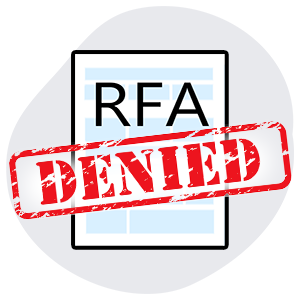CA: Will DWC Publish Physician UR Denial Data in 2024?
.gif)
January 1, 2024 is approaching. Will the California Division of Workers’ Compensation (DWC) comply with state law requiring the DWC to publish physician utilization (UR) data by that date?
Spoiler alert: not likely.
In 2019, California enacted Senate Bill 537, which added Section 138.8 to the Labor Code. This requires the DWC to publicly post detailed information on individual workers’ comp doctors — including how many of the treatments requested by each doctor were denied or modified by the claims administrator — by January 1, 2024.
While January 1st is only days away, no one should hold their breath in anticipation of this mandated UR data because it will be difficult for the DWC to publish data it doesn’t have.
As noted in an earlier daisyNews article, the DWC has not complied with the 2016 law instructing the DWC Administrative Director to electronically collect every UR decision issued by claims administrators.
As such, it’s hard to imagine how the agency could possibly compile useful UR statistics (or enforce UR laws and regulations).
Utilization Review Data Mandated by CA Law
Labor Code §138.8 mandates that the DWC annually publish on its website provider UR data for any physician who treats 10 or more injured workers. Those data include:
- The physician’s full name and specialty
- The physician’s National Provider Identifier (NPI) number
- The number of injured workers treated by the physician
- The ICD-10 codes of diagnoses and a description of each
- The number of UR decisions that modified or denied the physician’s requested treatments
- The number of Independent Medical Review (IMR) cases brought in response to denials or modifications of the physician’s requested treatments and the results thereof
We can’t help but wonder in whose interest it is to invite public scrutiny of individual doctors’ treatment requests — including information about IMR, in which the physician effectively has no role (only the injured worker may request IMR, not the physician).
However, for the DWC to publish meaningful UR data as required (by January 1st) would be difficult unless the DWC adheres to Labor Code Section 4610, which since 2016 has required the DWC to “...develop a system for the mandatory electronic reporting of documents related to every utilization review…”
To this day, the DWC has done nothing (that we know of) to fulfill that legal mandate — or to publish the required physician UR data by the first day of 2024.
Demanding a Solution to the UR Problem
As physicians fax claims administrators millions of Requests for Authorization (RFAs) with millions of medical documents to request millions of types of care for injured workers, no published data paint a complete picture of how compliant (or not) claims administrators are with existing UR laws and regulations (extremely limited data are available here).
Nor are there data to help any legislator, regulator, or injured worker advocate understand what care is being denied or delayed.
In 2016, to protect their constituents from inappropriate UR denial and delayed care, legislators passed Senate Bill 1160, demanding the DWC implement oversight of every UR decision. Specifically, legislators required claims administrators to electronically send the DWC every UR decision issued to a physician.
In 2019, California legislators demanded that by January 1, 2024, the DWC annually report treatment UR denial information, presumably from the UR decisions claims administrators electronically filed with the DWC.
Since the DWC never complied with the 2016 legislation to build an electronic UR data reporting system, how can the DWC possibly comply with the pending January 1st deadline to publish UR data.
Of course, California claims administrators benefit from the DWC’s lack of adherence to legislative demands because any potential patterns of UR wrongdoing cannot be prosecuted without the necessary data.
daisyAuth: UR Data Is Available
California law demands UR data because legislators recognize the importance of all stakeholders knowing:
- Which claims administrators might be abusing UR to deny or delay care, and
- Which physicians receive high rates of treatment denials
Collecting UR data is feasible with existing technology; daisyAuth allows physicians to submit RFA forms quickly, and daisyAuth can easily collect and publish reliable treatment data (including ICD-10 codes) from the over 2,000 RFAs submitted by daisyBill providers daily.
Unfortunately, the DWC failed to standardize the information claims administrators must send in UR decisions, making instructive UR data much more challenging to collect. A human must always read and decipher these decisions, which can often exceed 10 pages.
Because the DWC failed to issue a standardized UR decision form, a claims administrator may respond to an RFA on a toilet paper roll (as long as the sheets can be faxed). Without UR decision standardization, the DWC essentially forfeits meaningful access to the UR data that the Labor Code requires the agency to collect.
Will the DWC standardize the way information is sent in UR decisions? Probably not. Will the DWC muster the time, effort, and technical expertise to gather statewide UR data? Also, probably not.
All we know is that as long as the DWC can ignore California laws, injured workers will suffer from delays and potentially improper denials of care. Until someone takes responsibility for standardizing the UR decision into a form and gathering the data, California will remain in the dark about UR problems.
There’s no excuse for this failure; daisyAuth proves that RFA and UR data can be collected, as shown in the brief video below.
Submit RFAs in 30 seconds and automatically track UR decisions with daisyAuth. Request a demo below!
REQUEST DEMO
DaisyBill provides content as an insightful service to its readers and clients. It does not offer legal advice and cannot guarantee the accuracy or suitability of its content for a particular purpose.
.gif)



